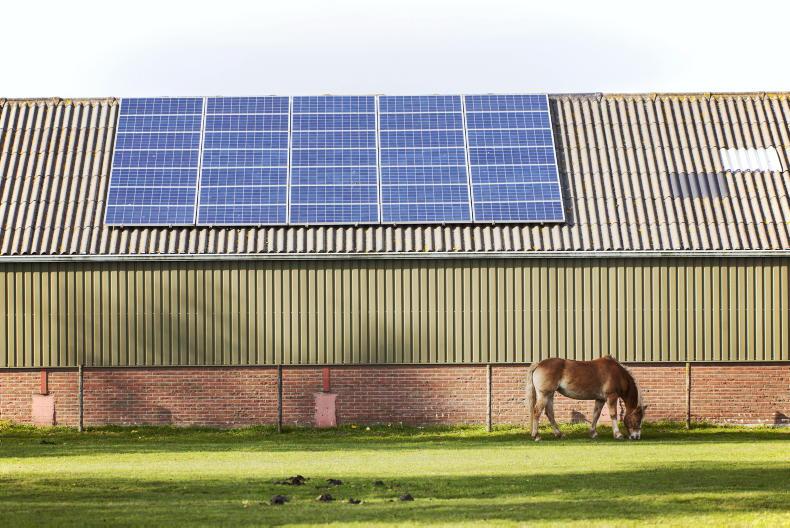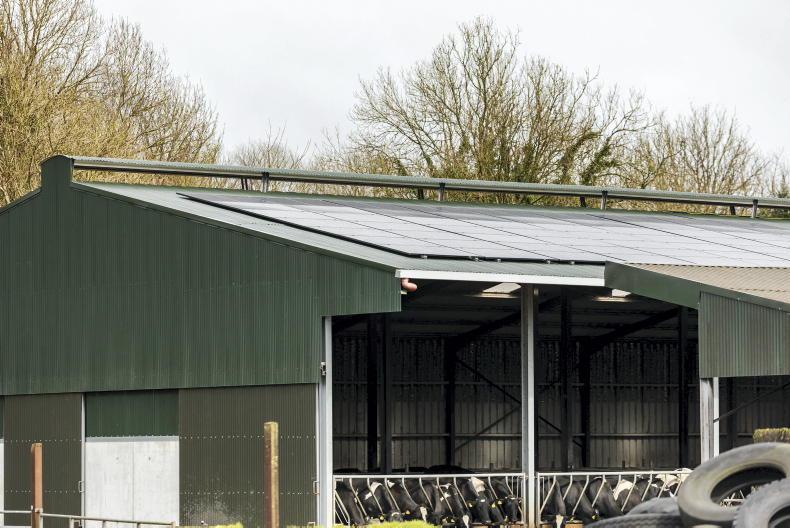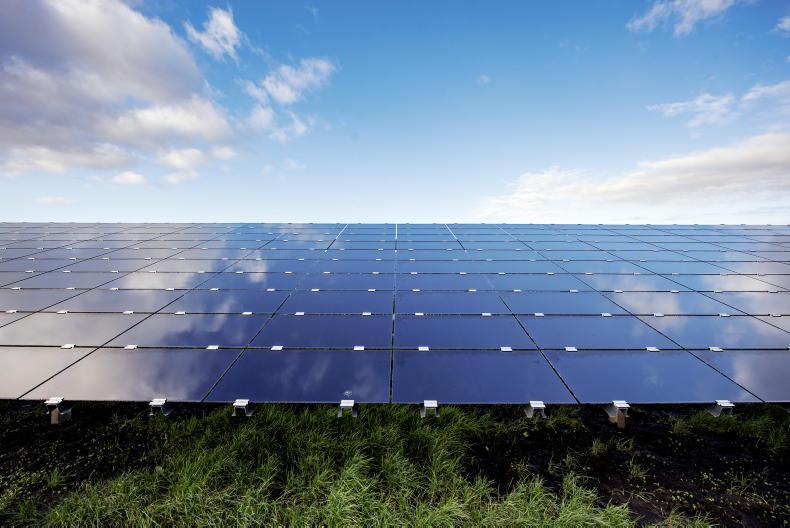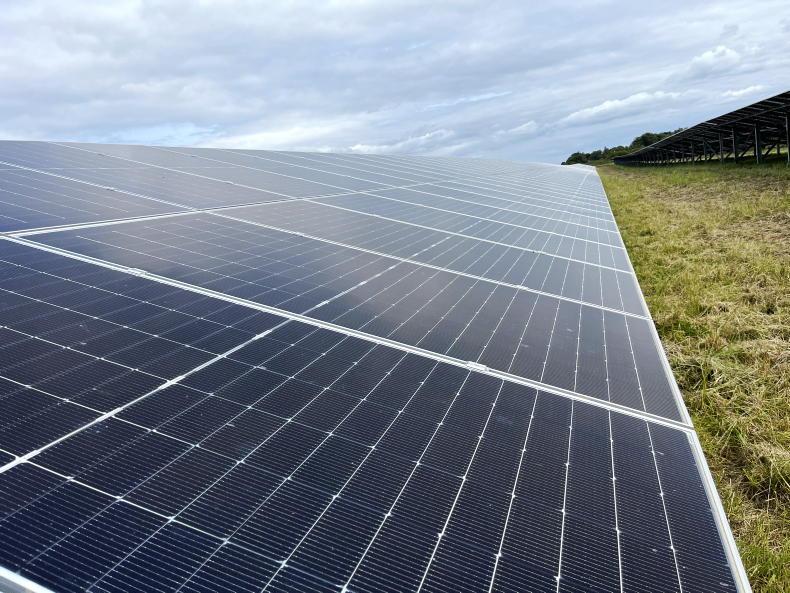Ireland has the potential to install upwards of 3,000 megawatts (MW) of solar PV on the roof spaces of farms and businesses “without using one acre of good agricultural land”, according to the Micro-Renewable Energy Federation (MREF).
MREF says the energy that would be generated through this has the potential to power the equivalent of more than 500,000 homes.
Megawatts are used to measure the output of a power plant and a typical coal plant about 600MW in size.
MREF outlined the potential of farm rooftop solar PV in their submission to Government on what resources for the sector should be included in Budget 2023.
It said: “For farmers, support for installing rooftop solar PV would help the agricultural sector deal with rising energy costs and, with the proper supports, can provide an additional income to help sustain farming businesses into the future.
“For too long, policy makers have failed to recognise these facts.”
Unnecessary TAMS restrictions
Tens of thousands of farmers across Europe are supported to install solar PV on their roofs with their governments providing an economic grant and/or a feed-in tariff payment to ensure that there is a reasonable return on their renewable energy investment, says MREF.
“They are ensuring that their electrical grid operators have the infrastructure and grid access is in place to accommodate distributive generation across regions,” it said.
It claimed that in Ireland, Government grant supports have been challenging to secure for farmers with “serious and unnecessary restrictions” under the Targeted Agriculture Modernisation Schemes (TAMS) grant scheme.
MREF called on policy makers to make available an “easily accessible” 30% grant payment “for all farmers and businesses that want to install solar PV up to a maximum grant payment for any business of €50,000”.
Feed-in tariffs
The renewable energy micro-generation feed-in tariff also needs to increase to a minimum of 17.5c/kwh and be indexed-linked to the consumer price index (CPI) for 15 years.
“A better approach would be to provide a 30% once-off grant for any farm or business wishing to install solar PV as set out above and to let the market related payment apply for any solar energy exported to the grid.
“At a minimum, a farmer or businessperson should have the choice of either getting a once-off 30% grant or opting for a premium payment of at least 17.5c/kwh,” MREF said.
MREF chair Pat Smith said: “As part of the Government’s commitments to the micro-generation sector, it needs to ensure that the prices they are offering for electricity are reflective of market realities and 17.5c/kwh is the minimum needed at this point to make it economic to install solar PV micro generation to export to the grid.”
Planning laws
In June, Minister of State for Planning and Local Government Peter Burke announced that rooftop solar photovoltaic (PV) installations on farms which cover the entire roof space are proposed to be exempt from requiring planning permission.
Commenting on the plans its budget submission, MREF said: “The Government and the Minister of State at the Department of Housing and Local Government in charge of overseeing this process need to ensure that these planning exclusions are passed into law immediately and demonstrate to all stakeholders in Ireland’s renewable energy transition that somebody is treating climate change enabling legislation seriously, and with urgency."
Read more
Proposal for rooftop solar on farms to be exempt from planning permission
Ireland has the potential to install upwards of 3,000 megawatts (MW) of solar PV on the roof spaces of farms and businesses “without using one acre of good agricultural land”, according to the Micro-Renewable Energy Federation (MREF).
MREF says the energy that would be generated through this has the potential to power the equivalent of more than 500,000 homes.
Megawatts are used to measure the output of a power plant and a typical coal plant about 600MW in size.
MREF outlined the potential of farm rooftop solar PV in their submission to Government on what resources for the sector should be included in Budget 2023.
It said: “For farmers, support for installing rooftop solar PV would help the agricultural sector deal with rising energy costs and, with the proper supports, can provide an additional income to help sustain farming businesses into the future.
“For too long, policy makers have failed to recognise these facts.”
Unnecessary TAMS restrictions
Tens of thousands of farmers across Europe are supported to install solar PV on their roofs with their governments providing an economic grant and/or a feed-in tariff payment to ensure that there is a reasonable return on their renewable energy investment, says MREF.
“They are ensuring that their electrical grid operators have the infrastructure and grid access is in place to accommodate distributive generation across regions,” it said.
It claimed that in Ireland, Government grant supports have been challenging to secure for farmers with “serious and unnecessary restrictions” under the Targeted Agriculture Modernisation Schemes (TAMS) grant scheme.
MREF called on policy makers to make available an “easily accessible” 30% grant payment “for all farmers and businesses that want to install solar PV up to a maximum grant payment for any business of €50,000”.
Feed-in tariffs
The renewable energy micro-generation feed-in tariff also needs to increase to a minimum of 17.5c/kwh and be indexed-linked to the consumer price index (CPI) for 15 years.
“A better approach would be to provide a 30% once-off grant for any farm or business wishing to install solar PV as set out above and to let the market related payment apply for any solar energy exported to the grid.
“At a minimum, a farmer or businessperson should have the choice of either getting a once-off 30% grant or opting for a premium payment of at least 17.5c/kwh,” MREF said.
MREF chair Pat Smith said: “As part of the Government’s commitments to the micro-generation sector, it needs to ensure that the prices they are offering for electricity are reflective of market realities and 17.5c/kwh is the minimum needed at this point to make it economic to install solar PV micro generation to export to the grid.”
Planning laws
In June, Minister of State for Planning and Local Government Peter Burke announced that rooftop solar photovoltaic (PV) installations on farms which cover the entire roof space are proposed to be exempt from requiring planning permission.
Commenting on the plans its budget submission, MREF said: “The Government and the Minister of State at the Department of Housing and Local Government in charge of overseeing this process need to ensure that these planning exclusions are passed into law immediately and demonstrate to all stakeholders in Ireland’s renewable energy transition that somebody is treating climate change enabling legislation seriously, and with urgency."
Read more
Proposal for rooftop solar on farms to be exempt from planning permission










SHARING OPTIONS